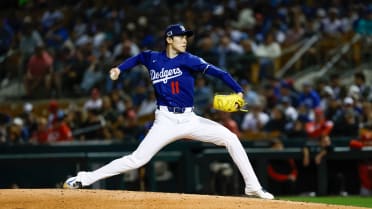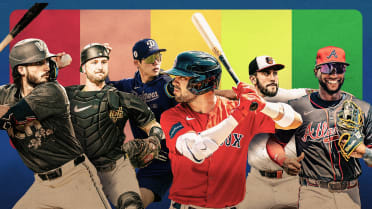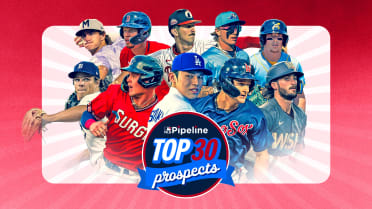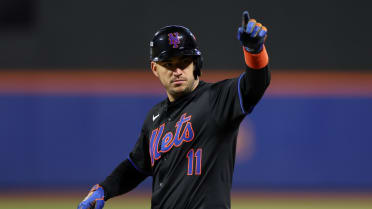QB or not QB: OU's Murray a top MLB Draft talent
Front-runner to replace Heisman winner a tantalizing option for teams
Three years ago, Kyler Murray turned down the possibility of being a first-round pick in Major League Baseball's Draft, opting instead to pursue a two-sport dream in college.
As this year's Draft approaches, the speedy outfielder is once again an intriguing option for the 30 Major League clubs, but the opportunity to be Baker Mayfield's successor as the starting quarterback for the University of Oklahoma is clouding Murray's future on the diamond.
:: 2018 Draft coverage ::
"If there was no football in the background, he would have definitely been looked at in the first or second round," one National League executive said. "His talent level would have put him there, for sure. He's an extremely talented tools guy."
MLB Pipeline ranks Murray as the No. 36 prospect in this year's Draft, though his status as front-runner to replace Mayfield means he's unlikely to spend much time -- if any -- in the Minors this year before he reports to Norman for football training camp.
Had Murray -- who became the first high schooler ever to be named an Under Armour All-American in both baseball and football -- wanted to begin a pro baseball career rather than play college football, he would have entered the 2015 Draft and likely signed a deal worth as much as $2 million to $3 million. But he chose to go to Texas A&M to play both sports, later transferring to Oklahoma. How will that impact the way teams view Murray as a prospect?
"The pros [of drafting him] are that you're giving yourself a chance to get a talented athlete that your system needs," an amateur scouting director said. "The downside of it is if he's the starting quarterback on a college football team of the caliber of Oklahoma, you're taking a huge risk because he's going to get hit a lot of times and a lot of things can happen with injury. As a hitter, you need a guy to dedicate himself to the craft of hitting and get repetitions."
2018 Draft order | 2018 Draft: June 4-6 | All-time Draft picks
Murray's father, Kevin, faced a similar quandary back in 1982. Drafted out of high school in the 18th round by the Brewers, Murray signed with Milwaukee for $35,000. He hit .161 over 41 games in the Appalachian League before deciding to quit baseball and attend Texas A&M to play quarterback. The Brewers sued Murray, accusing him of reneging on his baseball contract in what became an ugly lawsuit.
"There's some history in this both ways," the scouting director said. "It doesn't make it warm and fuzzy for a lot of people."
Now, 36 years later, Murray's son is both a legitimate baseball prospect -- albeit one with fairly limited playing experience -- and the front-runner to replace Mayfield, the reigning Heisman winner and No. 1 overall pick in this year's NFL Draft.
The younger Murray didn't play baseball during his freshman season after transferring to Oklahoma from Texas A&M, then had an unimpressive 2017 season in which he slashed .122/.317/.122 with no home runs, six RBI and 12 stolen bases in 27 games.
But the 2018 season put Murray back on the map; the redshirt sophomore is hitting .296/.398/.556 with 10 home runs, 47 RBIs and 10 steals in his first 51 games.
"At the plate, you would think a guy with his athleticism would have more aptitude to play defense than offense, but he's the opposite; he's more of an offensive player than a defensive player," Oklahoma baseball coach Skip Johnson said. "He's still in the process of maturing as an athlete. He's dynamic, he's physical. He reminds me of Andrew McCutchen."
"He can fly, he can throw, he can steal bases, he has plus bat speed and he makes good contact," said the NL executive, who has seen him play in person on more than one occasion. "He's not that raw at the plate. He's got a line-drive stroke with some power. I think he's got a chance to be a true five-tool guy; it's just a matter of whether he's going to play the game or not."
Oklahoma declined to make Murray available for interviews leading up to the Draft, but he wasn't offering up much insight about his future when asked about it by reporters in April.
"I'm not worried about that right now," Murray told reporters.
Lincoln Riley, OU's football coach, recently told the AP Top 25 College Football Podcast that he has had "some good private conversations" with Murray regarding his future, adding that the Sooners "certainly expect to have him" this fall.
That said, the Sooners' baseball coach believes Murray recognizes his future is on the diamond, not the gridiron.
"I think he knows he's going to be a baseball player vs. a football player long-term," Johnson said. "He talks about it. He knows where his game is and what he wants to do to get better in the game. He understands that; he's not 6-foot-5."
Murray's uncle, Calvin, was also a 5-foot-11 outfielder. He was drafted in the first round out of high school in 1989 (No. 11 by the Indians) and again in the first round in '92 (No. 7 by the Giants) after playing college ball at the University of Texas.
Calvin Murray played 288 games over five years with the Giants, Rangers and Cubs, though he never lived up to his early-career projections. Murray remains around the game, working for Scott Boras -- who represented him as a player -- for more than a decade.
According to a source, Kyler Murray will also be repped by Boras, further clouding his signability. Should Murray play football this fall (which feels like a near certainty), he could opt to play baseball for Oklahoma again next spring and try to raise his Draft stock. Unless a team is willing to overpay him this year, it remains to be seen whether the soon-to-be 21-year-old would sign for anything less than first-round money.
"He's obviously going to play football this year at Oklahoma; nobody is going to talk him out of that," the NL executive said. "What if he does well? He's supposed to be a Heisman candidate; what if he wins it? He doesn't profile as an NFL quarterback because of his height, but he might be athletic enough to convert him [to another position]. You just don't know. He might overachieve in football and play in the NFL, so that's where the risk is.
"There's no certainty that he's going to play baseball; that's the tough part. But somebody will roll the dice on him, no doubt. The talent level is too high."
Mark Feinsand, executive reporter for MLB.com, has covered the Yankees and MLB since 2001 for the New York Daily News and MLB.com.



